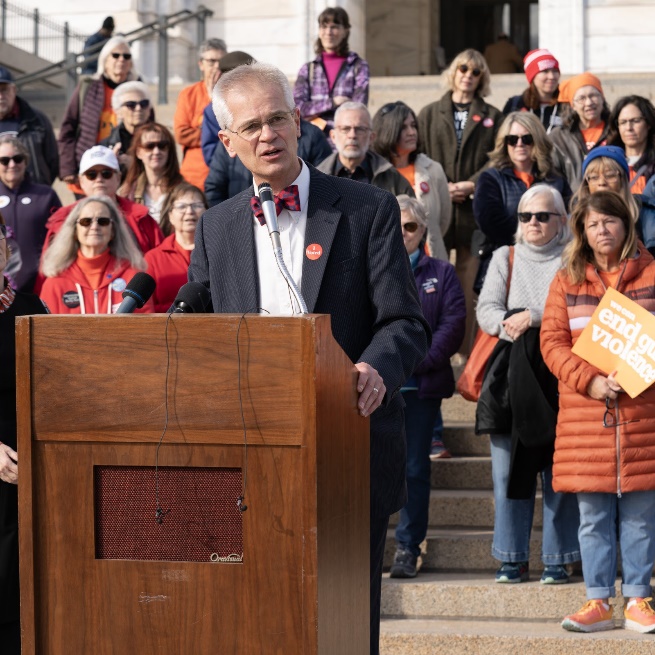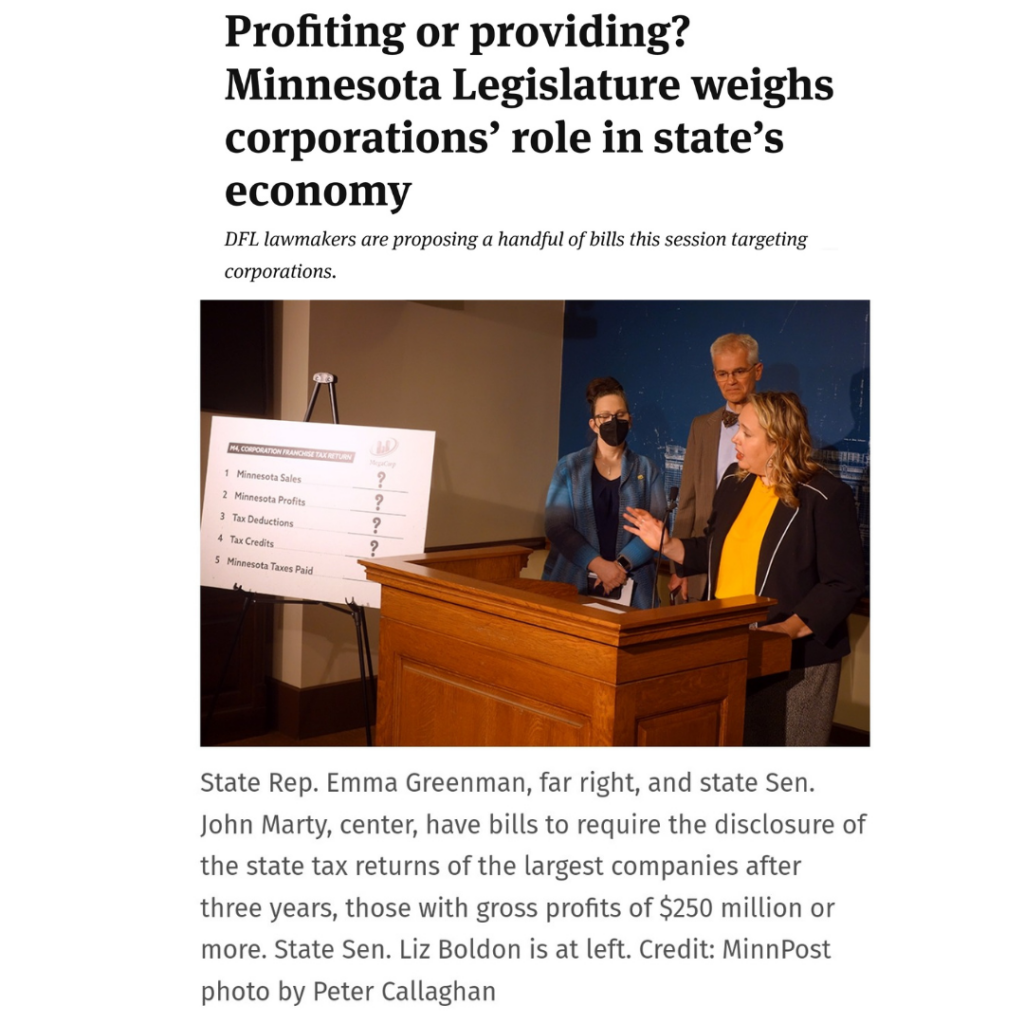Dear Friends and Neighbors,
The 2023-24 Minnesota Legislature was very productive in addressing many challenges facing the state. There is much more to do, so I am updating you on my work at the Capitol.
Thank you to all who have shared your thoughts on various legislative issues. Your calls, emails, and visits are helpful to me, not only in hearing your concerns, but also in developing and pushing legislation that will improve the lives of Minnesotans.
Here are some of the issues I worked on this year:
Responsible Budgeting
As chair of the Senate Finance Committee, I worked to build a responsible budget to address public needs, wisely investing larger than expected one-time revenues. The budget we adopted will strengthen our economy with strong education, human services, infrastructure, and housing investments, while being realistic about the challenges of projecting future revenues and expenditures.
Despite Republican criticism of the budget, last month, all three of the major credit-rating agencies: Fitch, Moody’s, and Standard & Poor’s, gave Minnesota their highest AAA rating, confirming that the legislature and administration have demonstrated responsible fiscal management.
Equal Rights Amendment
Unfortunately, we are still waiting! Over a century after women earned the right to vote, and fifty years after the federal Equal Rights Amendment passed the US Congress (but is still awaiting of ratification by some states,) Minnesota still has not passed an Equal Rights Amendment to the Minnesota Constitution. While the Minnesota Senate passed an ERA bill in 2023 (Senate File 37), the House didn’t take up the legislation until this session, and the legislature failed to reconcile the differences between the House and Senate versions.
As a longtime proponent of equal rights, I am disappointed in the failure to guarantee these constitutional rights to all people, regardless of their gender, race, disabilities, or distinctions which have been used to discriminate against them. I will continue pushing for its passage next session.
Packaging Waste
Currently 40 percent of our solid waste comes from product packaging. In 2024, Minnesota adopted a new recycling initiative that requires packaging producers to take on the cost and responsibility for reducing waste by funding a stewardship organization regulated by the Pollution Control Agency. The new law will make packaging easier to recycle, fund market development for these materials, and reimburse local governments running recycling programs. These are important steps in reducing this growing source of waste and environmental harm.
Gun Violence Prevention
We adopted legislation that bans “binary triggers” on guns, a device that enables a gun to fire twice for every pull and release of the trigger. Like “bump stocks” which make guns function more like machine guns, there is no place for them in our communities. We also increased penalties for straw purchases, where a person purchases guns for people who are prohibited from owning them. While these are positive steps forward, there is still much more to be done to stop the deadly epidemic of gun violence in our communities.

These laws make a difference. States with the weakest gun laws have a gun death rate more than 2.5 times higher than the death rate in states with the strongest gun laws! I will continue pushing for responsible regulation of firearms in Minnesota.
Legislative Reform
Over the past two years, I worked with the chair of the House Ways and Means Committee, to push for a better budget timeline. In both the 2023 and 2024 sessions, we successfully set an overall budget framework midway through session, instead of waiting until the last minute to come to an agreement. This enabled budget committees to work on their budgets in a responsible timeline rather than have everything decided at the last minute.
I have also been working to have the legislature reflect the constitutional requirement that all legislation contain a single subject. As Finance Committee chair, I was able to direct committee chairs to keep unrelated policy out of their budget bills.
Unfortunately, further progress was prevented because of the slow-motion, ongoing filibuster where certain Senators would, week after week, tie up time with repetitive speeches, often frivolous amendments, and numerous rants unrelated to the substance of the bills. At times, this meant that floor sessions that should have concluded by 3 p.m. dragged out until 3 a.m. The legislature does not function well at 3 a.m. and these obstructionist tactics crowd out time for debate on substantive, controversial matters.
To address this problem, I proposed a rule change that limits time for floor debate on bills, in a manner that is fair to both parties. With this change, the legislature will be able to focus on important issues, rather than the whims of members who appear intent on obstructing serious debate.
Failure to address this issue meant that there was not sufficient time to deal with bills individually at the end of the 2024 session, so many bills were quickly lumped together. This does not serve the public interest. We need thoughtful debates on substantive matters, not unlimited ranting on uncontroversial matters. I hope that next year, we can adopt Senate rules that make the process more transparent, fair, and responsive to the public.
Eliminating “Junk Fees”
Our economy has been overrun with “junk fees,” with consumers paying billions each year in unavoidable surprise charges that inflate prices. These non-optional fees – often labeled “convenience” or “processing fees,” are added to the consumer’s bill for buying a concert ticket, reserving a hotel room, paying rent, and countless other areas of the economy.
These fees make it more difficult for responsible businesses to be upfront about their pricing and often put small local businesses at a competitive disadvantage.
Our legislation, Senate File 3537, goes into effect in January and will require a listed price to include all mandatory fees and surcharges, ending this deceptive practice and benefit both consumers and responsible businesses.
Corporate Tax Transparency
Corporations play a major role in our economy, but they have a responsibility to the public in exchange for the rights and protections they have. In addition, corporations often obtain government subsidies and tax breaks.
The public has a clear right to know where these dollars are going. I authored legislation, SF4750, that would require the largest corporations doing business in Minnesota to disclose their Minnesota taxes. Non-profit organizations and unions already need to disclose their income, expenses, and other operational details.
The legislation puts minimal administrative or accounting burden on businesses, but it will shed light on the amount of taxes that large businesses are actually paying, and this disclosure can be very helpful in understanding whether corporations are paying their fair share. I will continue pushing this legislation next year.

Sports Betting
During debate on the proposed sports betting legislation in Minnesota, there has been extensive debate over who profits from this expansion of gambling, but far too little debate about the heavy costs on society due to significantly increased problems with gambling addiction.
Private sports betting is already legal in Minnesota – you can bet with friends, co-workers, strangers, anyone. However, when you bring in corporate sports bookmakers – businesses that profit from the amount you gamble – we create a huge problem where sports books, using predatory practices, turn more people from responsible social betters into people with serious gambling problems, betting money they don’t have and cannot afford to lose.
Other states that have legalized on-line sports bookmaking have seen as much as a tripling of calls to their problem gambling hotlines. Gambling addicts have a much greater risk of suicide, with half of those seeking treatment having considered suicide, and as many as one-in-five having attempted suicide.
As chair of the Senate Finance Committee, I do not see this legislation as producing a windfall of new revenue for the state, I foresee a large increase in new expenses, to address mental health and gambling addiction as well as higher crime, housing, and human services costs.
To ensure more discussion of the risks of predatory sports bookmaking, I introduced SF 5330, adding significant protections from problem gambling, with special emphasis on protecting minors and reducing risks facing athletes. My proposal would ensure adequate funding for addiction prevention and treatment. If Minnesota is to expand gambling with mobile sports betting, these protections are essential to prevent the higher costs that other states are already facing from problem gambling.
Ticket Reseller Transparency (The Taylor Swift Bill)
People trying to buy tickets for concerts, sporting events, etc. have often seen prices skyrocket because ticket resellers buy up many tickets to profit from reselling. Resellers often falsely present themselves as official ticket salespeople, sell tickets they don’t actually own, and tack on exorbitant fees. A new law passed this year will rein in these deceptive practices and add transparency and fairness to the system.
Sustaining Democracy
With the Supreme Court ruling that the US Presidents are now above the law and unaccountable, along with their rulings that significantly weakened the Voting Rights Act, our democracy is facing serious threats.
Although the legislature has no power to reverse these dangerous rulings, we can act to strengthen our democracy. In 2024, we adopted a Minnesota Voting Rights Act that will help protect Minnesota voters from discriminatory elections and redistricting practices.
Democracy can only survive with an informed electorate. At a time when misinformation is a growing problem, we need to ensure a healthy, vibrant news media to keep voters informed. The loss of so many independent local news sources, especially newspapers, needs urgent attention. I have been hearing from many constituents and non-partisan civic organizations like the League of Women Voters on their concerns about this.
In addition to helping people keep connected to their neighbors and community, local news is essential in helping the public hold public officials and large institutions accountable. I am exploring ideas for addressing this situation and welcome ideas that might be helpful.
It is an honor to serve you in the Minnesota Senate. Please continue to reach out to me or my staff: Elspeth Cavert, my committee administrator (elspeth.cavert@mnsenate.gov 651-296-5640) and Killian Becker, my legislative assistant (killian.becker@mnsenate.gov 651-296-6545)
Warm Regards,

John
3235 Minnesota Senate Bldg.
St. Paul, MN 55155
651-296-5645